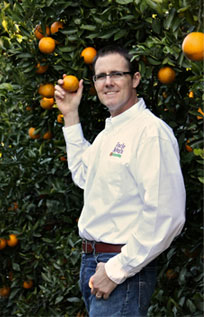Biological controls show promise for curbing citrus disease
By Arianne Pfoutz
Published: October 3, 2013
Category: Organic / Sustainable Farming

Matt McLean in his organic orange grove
To access all the articles in this month's issue of The Organic & Non-GMO Report, SUBSCRIBE NOW.
Uncle Matt’s Organic uses wasps, nutrients and botanical oils to combat OJ scourge
While recent media reports claim that genetic engineering is the only solution to a disease that’s devastating Florida’s citrus groves, an organic citrus producer has quietly and effectively developed solutions to the problem.
Citrus greening, a disease carried by the tiny Asian citrus psyllid that may have already infected 99% of Florida’s citrus groves, is threatening to collapse the industry. Also called huanglongbing (HLB), it was first discovered in Florida in 2003; by 2009 it had spread to all 32 of Florida’s citrus-producing counties.
The psyllid injects a bacterium into the tree, blocking the flow of nutrients and causing yellowing leaves, sour and misshapen fruit, premature fall, and eventual tree demise. It has caused $4.5 billion in losses from 2006 to 2011 alone, cost thousands of jobs, and tripled orange prices.
Growers and scientists are frantically pursuing solutions, from heating tents to increased use of toxic pesticides to developing genetically engineered citrus trees resistant to HLB.
The state’s largest organic citrus grower, Uncle Matt’s Organic, is seeing encouraging results in combating the disease using biological controls and organic practices. The results are being tracked by University of Florida researchers working with the Department of Plant Industry (DPI) of the Department of Agriculture, and the USDA.
Over the last 18 months, counts indicate that Uncle Matt’s organic groves had a “low” percentile of psyllid presence compared to conventional groves. Laura Batcha of the Organic Trade Association noted that this indicates “equal or better disease management” than using pesticides.
“We’d like to show skeptics this could work over time,” said Matt McLean, CEO of Uncle Matt’s.
The organic way
When Matt McLean launched Uncle Matt’s Organic in 1999, he wasn’t new to citrus farming.
“My great-grandfather Angus McLean was organic by default, growing citrus in the 1940s and 1950s. My grandfather Ben then became a conventional citrus grower like everyone else those days. After looking into organic to satisfy a juice brokerage customer I had, I convinced my father, also a conventional grower, that organic was the way to go.
“For me, organic just made the most sense,” says Matt. “Our philosophy is based on building healthy soils that will yield a healthier tree so it can naturally defend itself against disease.”
Uncle Matt’s team farms 1200 certified organic acres of citrus, with the help of 25 growers. Products include organic orange, apple, and grapefruit juices, lemonade, as well as organic avocados, blueberries and peaches.
Multi-pronged, sustainable approach to citrus greening
Matt’s brother Ben McLean III serves as vice president and director of research. With an MA in Horticulture, Ben collaborates with university scientists and has served on USDA’s Organic Research & Extension Initiative.
Ben explains the company’s four-pronged approach to citrus greening:
1. Biological controls: Thousands of parasitic wasps (Tamarixia radiata) are released every 21 days, providing control and management, not eradication, of the psyllids. The wasp lays an egg inside the psyllid nymph; when it hatches, it devours the nymph’s insides. Lady beetles, lacewings, and wolf spiders have also proven effective.
2. Boron nutrition: This method, under trial at the University of Florida, applies the essential mineral nutrient boron to the soil or the leaves. Reports suggest boron strengthens disease resistance—Uncle Matt’s orchards with the most boron application had fewer psyllids and less greening. Psyllids are repelled by high boron levels—they can’t digest the accompanying high sugar levels.
3. Slow-release nitrogen fertilizer: Organic nitrogen fertilizer makes the trees less attractive to pests. Synthetic ammonium nitrate, used in conventional groves, increases free nitrates and simple amino acids, attracting psyllids.
4. Botanical oils: Spraying with neem oil deters the pests, and is no more expensive than synthetics.
A fifth strategy is developing resistant varieties of citrus using traditional breeding. Promising varieties include Temple and Navel oranges, which are much less vulnerable to HLB than the premium Hamlins and Valencias.
Ben is optimistic. “I’d like to show growers that in organics we can live with greening, by putting these four approaches together,” he said. “We’re strengthening the immune system of the tree, and we are well below the industry average in fruit loss and symptom expression.”
© Copyright The Organic & Non-GMO Report, October 2013




